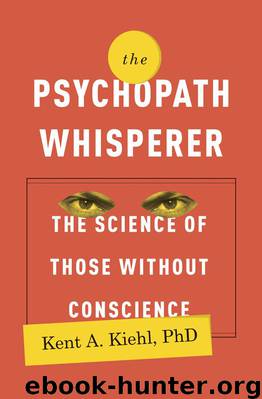The Psychopath Whisperer: The Science of Those Without Conscience by Kiehl Kent A. Phd

Author:Kiehl, Kent A. Phd [Kiehl, Kent A. Phd]
Language: eng
Format: epub
ISBN: 9780770435851
Publisher: Crown Publishing Group
Published: 2014-04-21T22:00:00+00:00
Callous and Unemotional Traits in Youth
Trying to assess and predict which children will become psychopaths as adults is a difficult task. Some have argued that scientists should not even attempt such an endeavor because one side effect of diagnosing a child as a psychopath is the possibility the label might stigmatize the child. Such labeling could also lead to a self-fulfilling prophecy. Others have suggested that if parents are told their children are psychopathic, it may further the divide between parent and child. Finally, parents of children labeled psychopathic may be stigmatized as well. These are very serious concerns, and my colleagues who study these high-risk children are very sensitive to these issues. Indeed, scientists in the field generally go to great lengths to avoid the term psychopathic when discussing these youth. The term that is most commonly used is callous and unemotional traits. Among psychologists, youth with significant callous and unemotional (CU) traits and disruptive behaviors, or conduct disorder, are known as CU/CD, or callous conduct disordered youth.
It is clear from my own clinical experience, echoed by most other forensic practitioners who work with psychopaths, that nearly all psychopaths were emotionally abnormal as children. So if we want to help understand how the condition develops, and how to answer parents’ questions about how to help manage and treat these children, scientists have to try to understand how these emotional symptoms manifest themselves early in life. Indeed, ignoring the problem or not studying the problem is absolutely not the right answer. Careful and thoughtful science is the answer to helping to address psychiatric disorders, and psychopathy in particular.
As I discussed previously, researchers and clinicians who use the DSM are trained on how to assess and relate the symptoms in the manual to the clients in their care. Typically, a thorough assessment is done on a client based on an interview and a review of the client’s life history. It is from this information that trained experts then determine the psychiatric diagnosis according to the guidelines of the DSM. However, psychology uses a number of other techniques to quantify and assess psychiatric symptoms.
Given that psychology is the study of behavior, it is also then the study of the brain, since all behavior emanates from the brain. Psychologists have devised a number of techniques for measuring and quantifying behavior.
One method psychologists use to assess personality traits is to give a client a list of questions to answer. These so-called self-report inventories can be quite long. For example, the first version of the popular Minnesota Multiphasic Personality Inventory (MMPI) had 567 questions. Psychologists use the MMPI to assess the various dimensions of personality—like trustworthiness and introversion (the ability to feel comfortable in social settings). Instruments like the MMPI are useful to develop an understanding of the personality problems the psychologist’s client might be experiencing so that an appropriate treatment program can be developed. Self-report tests are common in psychology, and they have recently been developed to assess CU traits in youth.
The first and
Download
This site does not store any files on its server. We only index and link to content provided by other sites. Please contact the content providers to delete copyright contents if any and email us, we'll remove relevant links or contents immediately.
The Art of Thinking Clearly by Rolf Dobelli(10489)
The 5 Love Languages: The Secret to Love That Lasts by Gary Chapman(9815)
Mindhunter: Inside the FBI's Elite Serial Crime Unit by John E. Douglas & Mark Olshaker(9343)
Becoming Supernatural by Dr. Joe Dispenza(8217)
Nudge - Improving Decisions about Health, Wealth, and Happiness by Thaler Sunstein(7706)
The Road Less Traveled by M. Scott Peck(7603)
Mastermind: How to Think Like Sherlock Holmes by Maria Konnikova(7347)
Enlightenment Now: The Case for Reason, Science, Humanism, and Progress by Steven Pinker(7313)
Win Bigly by Scott Adams(7198)
The Way of Zen by Alan W. Watts(6614)
Factfulness: Ten Reasons We're Wrong About the World – and Why Things Are Better Than You Think by Hans Rosling(4742)
The State of Affairs by Esther Perel(4721)
Gerald's Game by Stephen King(4654)
Man's Search for Meaning by Viktor Frankl(4606)
The Confidence Code by Katty Kay(4260)
Thinking in Bets by Annie Duke(4227)
The Healing Self by Deepak Chopra(3578)
Hidden Persuasion: 33 psychological influence techniques in advertising by Marc Andrews & Matthijs van Leeuwen & Rick van Baaren(3565)
The Worm at the Core by Sheldon Solomon(3487)
